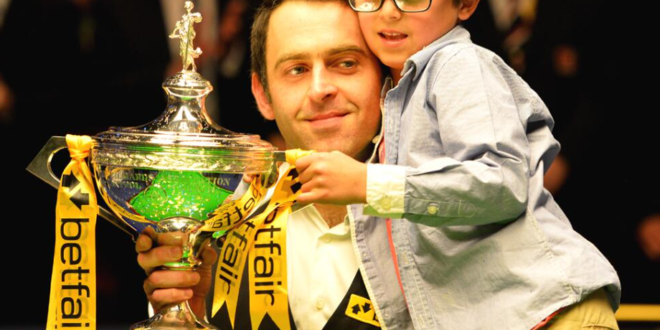MANCHESTER: After spending nearly a year away from the baize, Ronnie O’Sullivan predicted “car crash” TV as he launched the defense of his world snooker title.
In the end, his journey to recapturing the game’s biggest prize couldn’t have been smoother.
O’Sullivan, snooker’s most talented and controversial player, won the world championship Monday for the fifth time, defending his title by defeating fellow Englishman Barry Hawkins 18-12 in the final. Remarkably, he was playing his first major tournament since cutting short a yearlong sabbatical, during which time he labored for free on a farm, spent time with his kids and put on weight.
“I didn’t know what to expect really – my main motive wasn’t to come here and win it, it’s just I was so bored, sitting on the sidelines and nothing going on,” the enigmatic O’Sullivan said. “I thought I could do with something to keep me busy for the next six weeks, preparing for the worlds.
“It’s filled a nice gap of eight weeks – I’ve got to keep busy now otherwise I’ll implode.”
Imagine Rory McIlroy winning the British Open in his first event after taking a year out from golf. Or Roger Federer retaining his Wimbledon title in his first tournament after a season’s break.
O’Sullivan, who once achieved a maximum break in 5 minutes, 20 seconds and is as comfortable playing left-handed as he is with his right, has the same kind of superstar status in the snooker world. He is the most naturally gifted player the game has seen and he knows it.
“When Tiger Woods had his time out [after revelations of his extramarital affairs], I didn’t want to watch golf unless Tiger was playing,” O’Sullivan said last week. “In some ways, I think that’s what people would like from me – to play, whether I win or lose.”
Nicknamed “The Rocket,” O’Sullivan has long been snooker’s biggest box-office pull because of his fluent, speedy break-building, and he delighted his legion of fans in February by announcing his comeback from a self-imposed exile because he was “bored.”
Since winning his fourth world title in May 2012, O’Sullivan had played in just one minor event in September – losing in the first round – and was heading to the world championship at the Crucible Theatre in Sheffield with no match practice. He’d spent more time cleaning out stables and pigsties on a local farm than playing snooker.
“It’s going to be like my own reality TV show in a way,’ O’Sullivan warned in the lead-up to the worlds. “It could be a car crash, it could be good. You just don’t know. … I’ve never been one for doing Big Brother but this is about as close as it gets to it.”
One by one, the 37-year-old O’Sullivan dismantled a string of the world’s top players – including world No. 3 Judd Trump and 2012 runner-up Ali Carter – to reach the final without being behind in a match or losing a session. It was as if he’d never been away, breaking the Crucible record for centuries along the way.
There were the usual controversies for a man used to run-ins with authorities. He announced after his quarterfinal match that he was only competing because he was struggling to pay his kids’ school fees. During the semifinals, he was warned by a referee for making an obscene gesture with his cue.
In the final, he encountered a few tight spots against Hawkins before adding to his world titles from 2001, ’04 and ’08 and last year. He has never lost a final and only Stephen Hendry (seven), Steve Davis and Ray Reardon (both with six) have won it more times.
O’Sullivan, who has battled depression and once checked into The Priory to rehabilitate after alcohol and drug problems, is expected to slip back into semiretirement. The demands of snooker, which is looking to expand globally particularly in the hot-bed of China, require too much traveling and dedication for O’Sullivan, a father of three.
“I want to balance it [snooker] with other stuff,” said O’Sullivan, who has been helped by the work of renowned sports psychologist Dr. Steve Peters for his last two world titles. “I realize that in the year out, I didn’t miss snooker. I just missed having something to do.
“If I can balance it with other things, that’s the way forward. You feel trapped sometimes when it’s just snooker, snooker, snooker. I’m not good at dealing with all the emotions that come with it.”
He has threatened to quit the game numerous times, however, and has shown he struggles to stay away from it. So there are reasons for fans to be hopeful he’ll be back in Sheffield next May.


